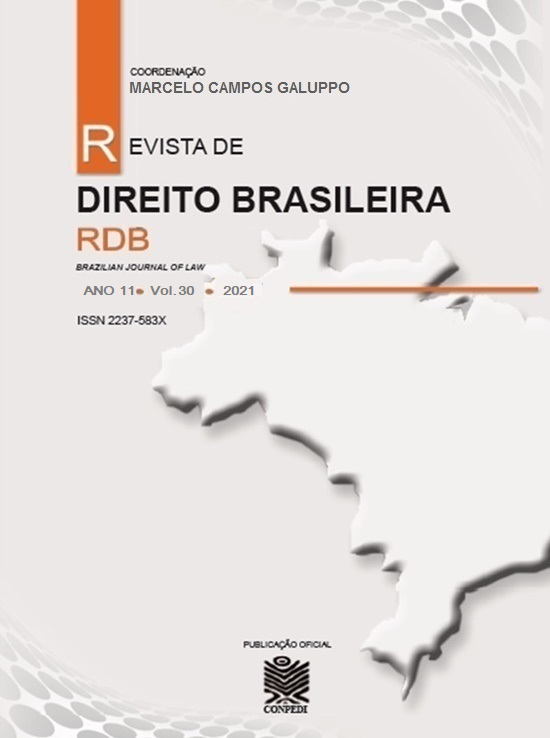LEGAL RULES CREATED BY COURTS: AN OVERVIEW
Conteúdo do artigo principal
Resumo
Downloads
Detalhes do artigo
• O(s) autor(es) garante(m) que a contribuição é original e inédita e que não está em processo de avaliação em outra(s) revista(s);
• A revista não se responsabiliza pelas opiniões, ideias e conceitos emitidos nos textos, por serem de inteira responsabilidade de seu(s) autor(es);
• É reservado aos editores o direito de proceder ajustes textuais e de adequação do artigo às normas da publicação.
Autores mantêm os direitos autorais e concedem à revista o direito de primeira publicação, com o trabalho simultaneamente licenciado sob a Licença Creative Commons Attribution que permite o compartilhamento do trabalho com reconhecimento da autoria e publicação inicial nesta revista.
Autores têm autorização para assumir contratos adicionais separadamente, para distribuição não exclusiva da versão do trabalho publicada nesta revista (ex.: publicar em repositório institucional ou como capítulo de livro), com reconhecimento de autoria e publicação inicial nesta revista.
Autores têm permissão e são estimulados a publicar e distribuir seu trabalho online (ex.: em repositórios institucionais ou na sua página pessoal) a qualquer ponto antes ou durante o processo editorial, já que isso pode gerar alterações produtivas, bem como aumentar o impacto e a citação do trabalho publicado (Veja O Efeito do Acesso Livre) emhttp://opcit.eprints.org/oacitation-biblio.html
Referências
ALEKSEEV S. S. Pravo na poroge novogo tysyacheletiya. Nekotorye tendentsii mirovogo pravovogo razvitiya - nadezhda i drama sovremennoy epokhi [Law at the dawn of a new millennium. Some trends in the global legal development are the hope and drama of the modern era], Moscow: Statut, 2000. p. 121.
ALEKSEEV S. S. Problemy teorii prava. Kurs lektsiy v dvukh tomakh [Problems of the theory of law. A course of lectures in two volumes]. v. 2. Sverdlovsk. 1973. p. 95.
BONDAR N. S. Sudebnyy konstitutsionalizm v Rossii v svete konstitutsionnogo pravosudiya [Judicial constitutionalism in Russia in the light of constitutional justice]. Moscow: Norma: INFRA-M, 2011. p. 128.
BRATUS S. N., VENGEROV A. B. Ponyatie, soderzhanie i formy sudebnoy praktiki [The concept, content and forms of judicial practice]. In: Sudebnaya praktika v sovetskoy pravovoy sisteme [Judicial practice in the Soviet legal system], Moscow, 1975. p. 65.
FEDERAL'NYY ZAKON OT 28.06.2014 № 186-FZ “O vnesenii izmeneniy v Arbitrazhnyy protsessual'nyy kodeks Rossiyskoy Federatsii” [Federal Law "On Amendments to the Arbitration Procedural Code of the Russian Federation" of jun., 2014], Sobranie zakonov RF [Corpus of Russian Legislation], 2014. n. 26 (Part 1). Article 3392.
GADZHIEV G. A. Pravovye pozitsii Konstitutsionnogo Suda RF kak istochnik konstitutsionnogo prava [Legal positions of the Constitutional Court of the Russian Federation as a source of constitutional law]. In: Konstitutsionnoe pravosudie v postkommunisticheskikh stranakh [Constitutional justice in post-communist countries], Collection of reports. Moscow, 1999. p. 116.
GUK P. A. Sudebnaya praktika kak forma sudebnogo normotvorchestva v pravovoy sisteme Rossii: obshcheteoreticheskiy analiz [Judicial practice as a form of judicial rulemaking in the legal system of Russia: a general theoretical analysis]. Doctorate Thesis in Law, Moscow, 2012. p. 233.
LAZAREV L. V. Konstitutsionnyy Sud Rossii i razvitie konstitutsionnogo prava [The Constitutional Court of Russia and the development of constitutional law]. Zhurnal rossiyskogo prava [Journal of Russian Law], 1997. n. 11, p. 3-13.
LAZAREV L. V. Pravovye pozitsii Konstitutsionnogo Suda Rossii [Legal positions of the Russian Constitutional Court], Moscow: Gorodets, Formula Prava, 2003. p. 75.
PROBLEMY TEORII GOSUDARSTVA I PRAVA [ISSUES OF THE THEORY OF STATE AND LAW]. Moscow: Yuridicheskaya literatura, 1987. p. 407.
REUTOV V. P. Edinstvo terminologii kak proyavlenie kul'tury yuridicheskogo yazyka [The unity of terminology as a manifestation of the culture of the legal language]. Yuridicheskaya tekhnika [Legal technique], 2016. n. 10. p. 267.
SALIKOV, M. S. Pravovye pozitsii Konstitutsionnogo Suda Rossiyskoy Federatsii: ponyatie i sistema [Legal positions of the Constitutional Court of the Russian Federation: concept and system]. Pravovedenie [Legal studies], 2003, n. 5, p. 50-51.
SOBRANIE ZAKONOV RF [Corpus of Russian Legislation], 2010. n. 50. Article 6611.
SOBRANIE ZAKONOV RF [Corpus of Russian Legislation], 2010. n. 52 (Part 1), Article 6994.
STEPANOV, S. A. Sudebnoe normotvorchestvo, ego formy i mesto v mekhanizme pravovogo regulirovaniya [Judicial rule-making, its forms, and place in the mechanism of legal regulation]. Rossiyskoe pravo: obrazovanie, praktika, nauka [Russian law: education, practice, and science], 2018. n. 6. p. 53.
STRASHUN, B. A. Resheniya Konstitutsionnogo Suda Rossiyskoy Federatsii kak istochnik prava [Decisions of the Constitutional Court of the Russian Federation as a source of law]. Konstitutsionnoe pravosudie [Constitutional Justice], 2001. No. 4; 2002. n. 1, p. 57-59.
VITRUK, N. Pravovye pozitsii Konstitutsionnogo Suda Rossiyskoy Federatsii: ponyatie, priroda, yuridicheskaya sila i znachenie [Legal positions of the Constitutional Court of the Russian Federation: concept, nature, legal effects, and meaning]. In: Konstitutsionnoe pravosudie v postkommunisticheskikh stranakh [Constitutional justice in post-communist countries], Collection of reports. Moscow, 1999. p. 89.
VOLKOVA, N.S.; KHABRIEVA, T.Y. Pravovye pozitsii Konstitutsionnogo Suda Rossiyskoy Federatsii i parlament [Legal positions of the Constitutional Court of the Russian Federation and the Parliament]. Moscow: Norma, 2005. p. 50.





